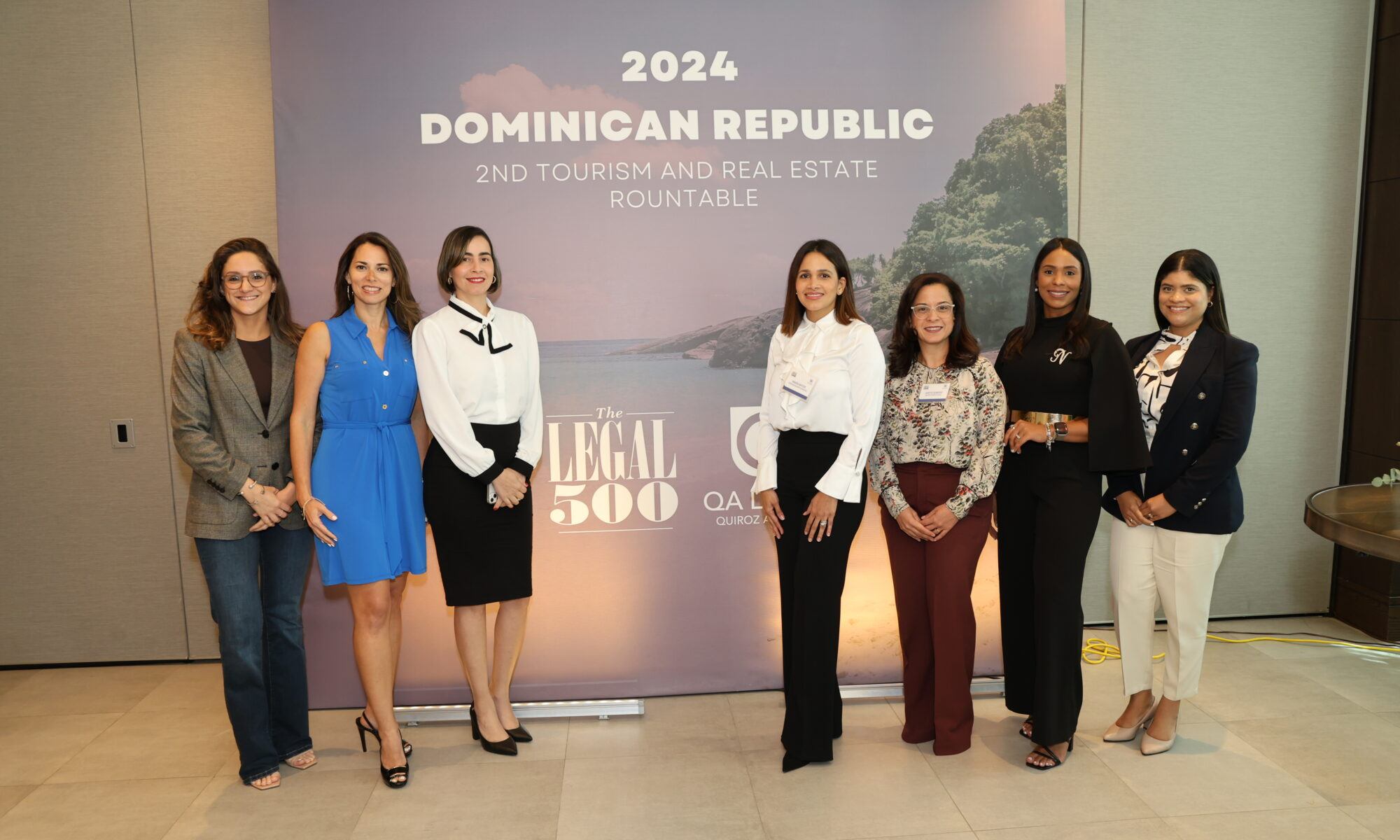Event Report
The second edition of the roundtable in the tourism and real estate sectors of the Dominican Republic provided an invaluable platform for discussing the key issues affecting both industries, particularly Fiscal Reform and the Territorial Planning Law. Sponsored by Quiroz Advisors Legal (QA Legal), the event brought together a diverse group of stakeholders, including legal experts, industry leaders, and international representatives, all keen to assess fiscal policies and their implications for tourism and tourism-related real estate.
The opening remarks set the tone for a productive dialogue, underlining the importance of maintaining this forum as a regular event for addressing the sector’s ongoing challenges. Esteemed local speakers, with a broad range of expertise, were joined by participants who contributed virtually, offering valuable international perspectives.
A central topic was the proposed fiscal reform, particularly Article 21, which was viewed as a significant threat to the sector. Raymi Mejía, partner at Mejía Lora & Asociados, highlighted how this reform could undermine essential incentives that have long supported competitiveness in the global tourism market. ‘Tourism is the engine of the economy’. He drew comparisons with other countries, like Panama and Costa Rica, which continue to maintain similar incentives. Mejía also shared the example of Puerto Plata’s tourism decline after the repeal of its incentive laws, stressing the need for such measures to drive investments and sustain the broader economy.
Aguie Lendor, Vice President of Asonahores, expanded on these concerns, pointing to the removal of fuel tax exemptions and the proposed 15% tax on air ticket freight, which could negatively affect the competitiveness of the industry. She also noted the rising difficulty for tourists in choosing the Dominican Republic as a destination due to increasing flight costs, with destinations like Cancun proving more affordable. Hotels, particularly those relying on non-regulated electricity, were also highlighted as facing rising costs, further exacerbating the sector’s challenges.
The conversation then shifted to the regulatory environment, with speakers expressing concerns about the slowdown in investment since the modification of incentive laws. Lendor noted, for example, that Puerto Plata had seen a reduction in incentives from 35% to just 5%, which had hindered investment despite efforts to improve the city’s infrastructure. Without adequate incentives, investors are increasingly turning to more competitive destinations, like Jamaica.
Further discussion addressed the lack of infrastructure to support tourism growth, with many hotels needing to build their own basic services, such as water treatment plants and sewer systems, due to the state’s inability to supply these. Lendor drew a comparison to Mexico, where infrastructure is already in place to support tourism investments. Alba Russo, Legal and Interinstitutional Relations Director from Asonahores, also stressed the need for a comprehensive strategic tourism plan, particularly with regard to land use and territorial planning, in light of increasing water shortages in areas like Punta Cana.
As the first round of discussions concluded, it became clear that there is a pressing need for a more comprehensive approach to tourism policy. It was recognised that the proposed reform law, while addressing important issues, is incomplete and needs to be more inclusive, integrating provisions for short-term tourist rentals and updating incentives for older hotels. Speakers highlighted the importance of proper oversight and clearer guidelines to ensure that incentives benefit only those projects that meet the necessary criteria.
José Quiroz, Founding Partner of Quiroz Advisors, played a crucial role in facilitating this engaging discussion, ensuring that all perspectives were heard. He then introduced the second topic of the day, which focused on land use and territorial planning, handing the floor to Gustavo Valdéz, an architect from CVYA – ARQUITECTOS URBANISTAS, to share his insights. Valdéz emphasized the importance of the Ley de Ordenamiento Territorial (Territorial Planning Law) as a critical step forward, providing a structured approach to managing land use and mitigating issues of discretionality in land-use decisions. This law aims to create a unified approach to territorial planning, ensuring better cooperation among government agencies, with a focus on infrastructure and sustainable growth. All the current trends in state activities must align to ensure that this planning is done collaboratively and incorporates all perspectives. Public participation was also stressed as essential for the success of this law.
Julio Facal, drawing from his international experience at the United Nations World Tourism Organization (UNWTO), discussed the challenges and necessity of implementing territorial planning laws for tourism. He emphasised the need for structured planning to avoid significant issues such as “touristification” and environmental damage. Facal stressed the importance of differentiating between tourist and residential land use and the need for technical intervention while advocating for sustainable tourism that balances environmental protection with community welfare. He noted that certain regions have strict coastal development regulations.
He warned against making exceptions to planning laws, as these could undermine their integrity, emphasising the importance of clear guidelines. Facal also advocated for community involvement in planning to ensure that regions have the necessary infrastructure and capacity to support tourism. Moreover, local communities should benefit from tourism growth, not just visitors. Addressing rising environmental challenges, such as the increasing presence of sargassum, requires creative and innovative solutions. Coordination among various authorities is essential to avoid bureaucratic delays and ensure that tourism is responsibly incorporated into territorial planning.
The roundtable concluded with a strong consensus: the tourism and real estate sectors are open to innovations; however, any reforms must safeguard the vital incentives that have driven their growth. The conversation highlighted the need for a nuanced, balanced approach—one that not only maintains the sector’s economic impact but also ensures its long-term sustainability.
Participants left with a shared commitment to ongoing dialogue and collaboration, setting the stage for future sessions that will continue to shape the trajectory of tourism and real estate in the Dominican Republic. As we look ahead to the next roundtable, we’re excited to build on these discussions, fine-tune our strategies, and work in unison to preserve the Dominican Republic’s standing as a top-tier, competitive destination for both travelers and investors.
